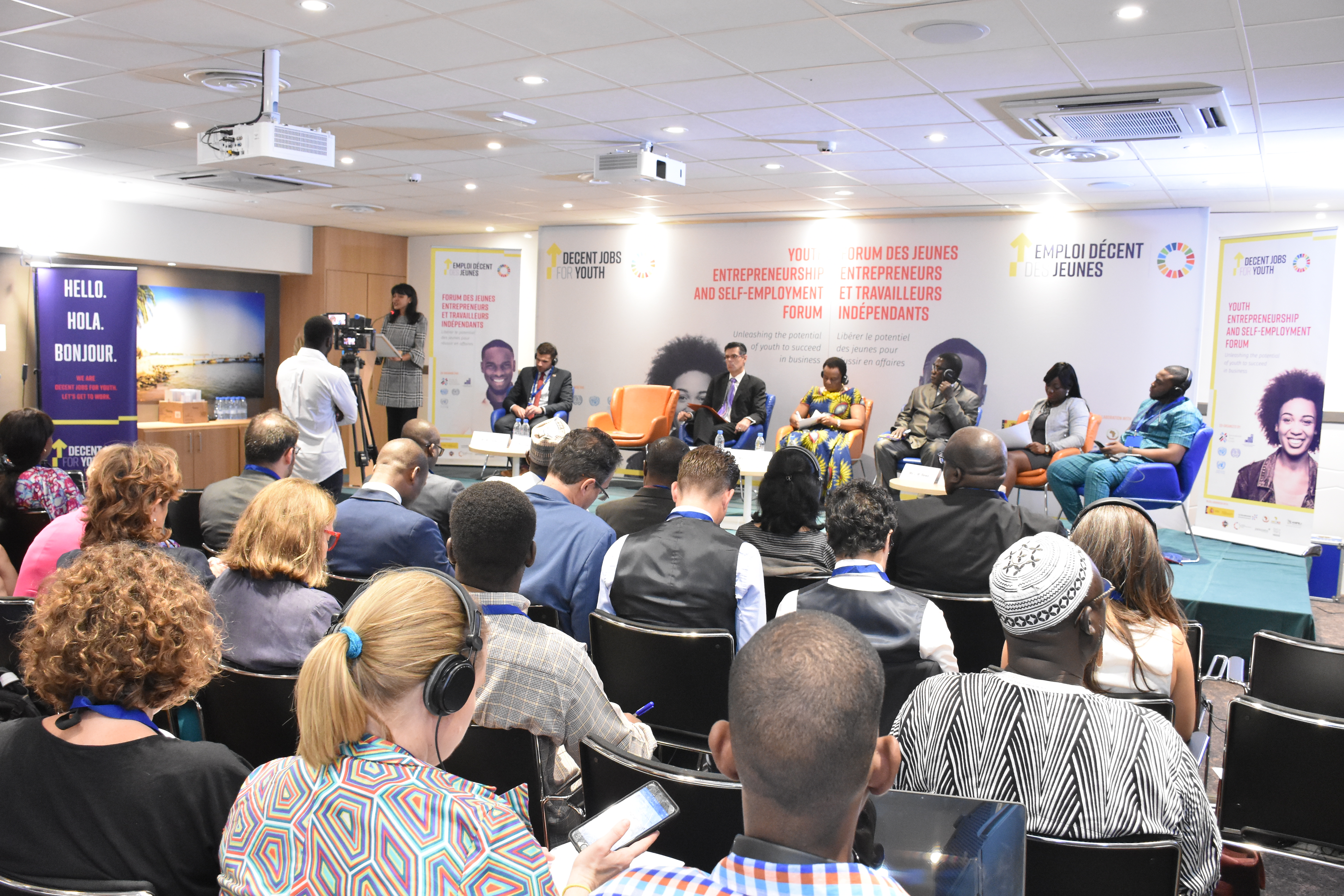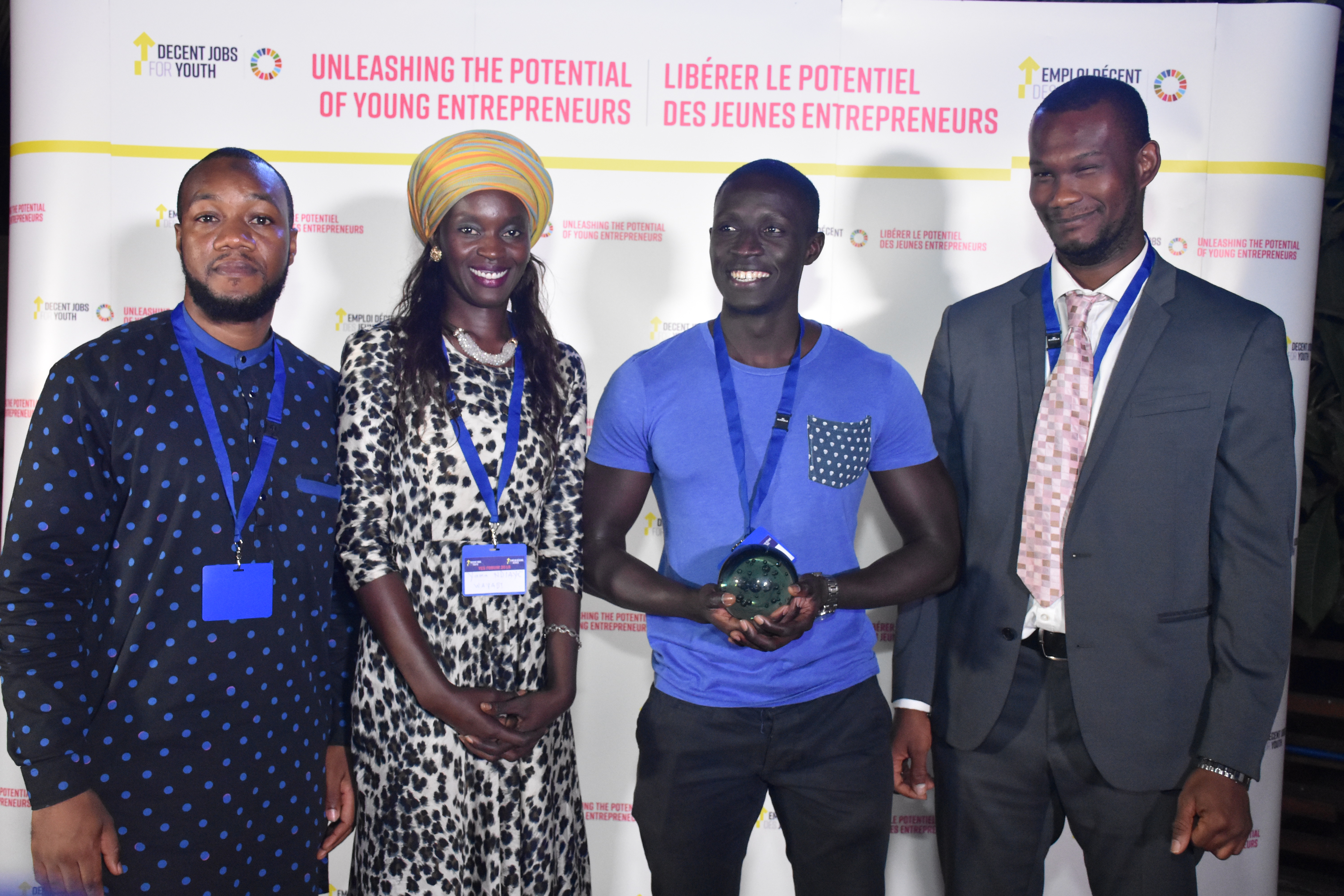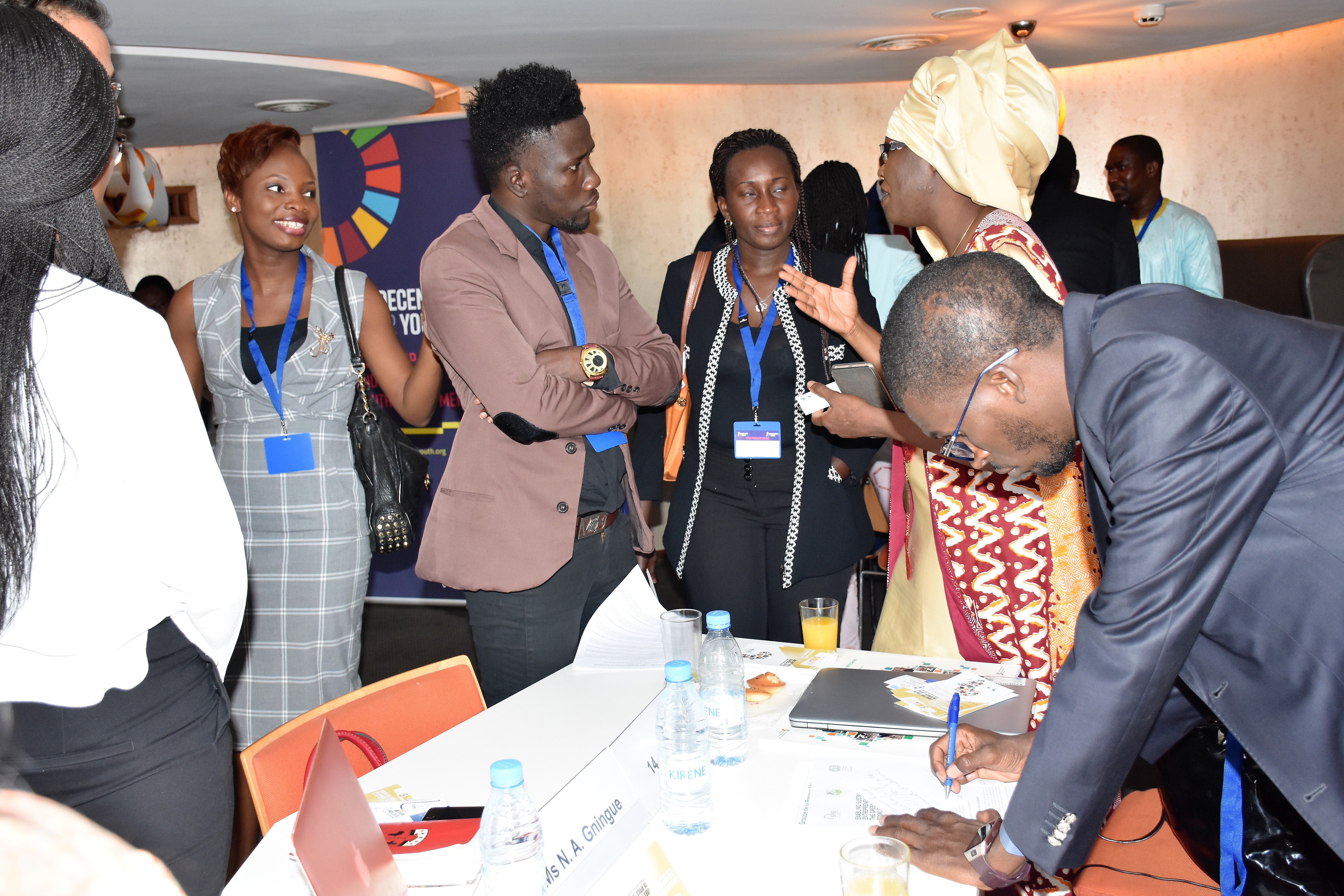The two-day event was held in Dakar, Senegal on 13-14 November 2018 during the Global Entrepreneurship Week. It was a featured event of the Global Entrepreneurship Week and was jointly co-organized by the partners of the Global Initiative on Decent Jobs for Youth: International Labour Organization (ILO), International Trade Centre (ITC), United Nations Capital Development Fund (UNCDF), United Nations Conference on Trade and Development (UNCTAD) and the United Nations Industrial Development Organization (UNIDO). It is held in collaboration with the Government of Senegal, Agence Nationale pour la Promotion de l’Emploi des Jeunes (ANPEJ), Agence Sénégalaise de Promotion des Exportations (ASEPEX), the Government of Spain, the Government of Luxembourg, NEPAD Planning and Coordination Agency, Nestlé and Jokkolabs, host of the Global Entrepreneurship Week in Senegal.

The event provided a platform for over 250 stakeholders involved in Decent Jobs for Youth and particularly in the area of youth entrepreneurship and self-employment to engage, share experiences, innovations, and opportunities for scaled action.
The event programme covered three main themes:
The event format was as follows:


The event gathered together over 250 youth employment stakeheholders to:

 Collapse
Collapse
Joannie Marlene Bewa
UN Young Leader for the Sustainable Development Goals

Charles Immanuel Akhimien
UN Young Leader for the Sustainable Development Goals

Mohamed Fadel
AIESEC

Priya Gajraj
United Nations Resident Coordinator, Senegal

H.E. Alberto Antonio Virella Gomes
Ambassador of Spain to Senegal

Dorothy Tembo
International Trade Centre

Finda Koroma
ECOWAS Commission

Aminata Kouyaté
National Director of Youth Employment, Guinea

Martin Ruvugabigwi
Commonwealth Alliance of Young Entrepreneurs

Fiorina Mugione
UNCTAD

Richard Zulu
Business Innovation Consortium

Christian Jekinnou
Afric’Innov

Beran Dondeh
Information Technology

Fatoumata Niang Niox
Jokkolabs

Regina Mbodj Brown
CTIC Dakar

Martin Labbé
ITC

Abraham Déthié Diouf
Nestlé, Senegal

Othmane Benhlima
Eco-Heat

Bibusa Wissemann
SensXAfrica

Emanuele Santi
Afrilantropy

Vital Sounouvou
Exportunity Group

Matteo Landi
UNIDO

Ousmane Ba
Agence Nationale pour la Promotion de l’Emploi des Jeunes, Senegal

Khady Ndiaye
Sentaar

Ibrahim Lahouli Kabore
Aviculture

Dianne Cornes
Youth Business International

Ata Cisse
UNCDF

Hadja Ba
Strategy, Risk and Performance, INTOUCH

Sobel Ngom
Social Change Factory

Yann Le Beux
YUX

Makhan Sacko
Sahel Analytics

Alpha Bacar Barry
Jatropha

David Cordobés
ITC

Mujinga Tambwe
ITC

Mariama Johm
Afri Taste

Arielle Kitio
CAYSTI

Abdourahamane Diallo
Coopérative pour l\\\\\\\'Agriculture et la Production Animale

Nuwajuna Justus Kamuhanda
Just-us Investment

Chérifatou Ibrahima Agoumo
NIGERBIOGAZ

Rotimi Williams
Kereksuk Rice Farm

Lamia Naji
Mastercard Foundation

Oumar Syll
FAO, Senegal

Malick Sy
UNIDO, Senegal

Ambrose Ayooluwa Ayodele
FESTO Didactic

Karamoko Diarra
Institute of Higher Education for Agriculture and Entrepreneurship, UCAD

Christophe Yvetot
UNIDO

Khadidiatou Diop Ndiaye
Agence Nationale pour la Promotion de l’Emploi des Jeunes

Hugues Legros
LuxDev

Bamba Fall
Entrepreneurship training

Charles Ocici
Enterprise Uganda

José Manuel Medina
ILO, Cabo Verde

Nadja Nutz
ILO

Amadou Lamine Diagne
Ministry of the Environment and Sustainable Development, Senegal

Baba Drame
PACEV programme, Senegal

Amy Mbengue
ECOBAG

Oumar Basse
Nano Air

Moustapha Kamal Gueye
ILO

Cheikh Thaim
Entrepreneurship trainer, Senegal

Djamila Gueye
Djamila Gueye

Emanuela Benini
Italian Agency for Development Cooperation

TBC
Délégation Générale à l’Entrepreneuriat Rapide des Femmes et des Jeunes

Charleine Mbuyi-Lusamba
ILO

Oduyebo Simeon Adekunle
Enterprise Development and Promotion Department, Ministry of Youth and Sports, Niger

Fati N’Zi-Hassane
Skills and Employment for Youth Programme, NEPAD Planning and Coordinating Agency

Rui Fernandes
Cooperation, Embassy of the Grand Duchy of Luxembourg in Senegal

Lucia Ahoefa Allah-Assogba
TOGOSIME

Rotimi Opeyemi Olawale
JR Farms Limited

Ghada Khalifa
Microsoft Philanthropies

Sukti Dasgupta
ILO

François Murangira
Decent Work Team, Country Office for Senegal, Cabo Verde, The Gambia and Guinea, ILO

Mao Ba
BIOSENE

Abdoulaye Seye
Hub Rural

Oscarine Mboye
TBD

Lamin Darboe
National Youth Council, The Gambia

Cristiana Finotti
Microcred, Senegal

Brianna Losoya-Evora
ANDE

Abdoulie Singhateh
NEDI

Adel Elsayed Sparr
UN Office of Counter-Terrorism

Jeph Acheampong
Blossom Academy

Ismaila Sambou
Gambia Youth Chamber of Commerce

John Trew
Plan International

Peter Loewi
UN MGCY

Callie Ham
ILO

Djonabaye Israel
iPLUS and The Builders

Eric M. Tamandja
National Coalition for Youth Employment (CNEJ)

Ndeye Absa Gningue
African Development Bank

Gallo Diop
Club Ohada Thies

Kone Gninlnagnon
RAJEL International

Gabriel Luciano Preira
Senegalese Ministry on Youth

Maria Perdomo
UNCDF
Tue, 13 Nov 2018 08:00 am To 21:00 pm
Summary
In the opening remarks all speakers highlighted the statistics of youth unemployment and underemployment, 63 million young people being unemployed and over 141 million being employed but living in poverty. Taking this as a starting point, they unanimously emphasized the importance to jointly tackle this youth employment challenge along with the high potential of entrepreneurship to foster growth and development. Entrepreneurship was also considered in the context of addressing international migration. A mutual dialogue between youth and policy makers as offered at the YES Forum is critical to effectively work together, listen to young people and address the urgent needs of youth to allow them to connect to the resources they need in order to realize their economic potential. The Plan Sénégal Emergent makes youth entrepreneurship and self-employment a priority, underlining the relevance of this issue as a major concern for the host country of the forum. Joint efforts and inclusive partnerships are needed to remove barriers that youth suffer from in the world of work and to rise up to this key challenges for the region of West Africa. The United Nations Youth Strategy and the Global Initiative on Decent Jobs for Youth are a proof of the international commitment and the much needed partnerships to adequately address this global priority.
Session organizer(s)
Speakers

Joannie Marlene Bewa
UN Young Leader for the Sustainable Development Goals

Charles Immanuel Akhimien
UN Young Leader for the Sustainable Development Goals

Mohamed Fadel
AIESEC

Priya Gajraj
United Nations Resident Coordinator, Senegal

H.E. Alberto Antonio Virella Gomes
Ambassador of Spain to Senegal

Dorothy Tembo
International Trade Centre

Gabriel Luciano Preira
Senegalese Ministry on Youth
Images
Videos
Testimonials
Overview
Promoting youth entrepreneurship and self-employment calls for actions at policy and institutional levels. Evidence shows that effective reforms in business environments lead to the emergence of new firms and job creation. The session focuses on understanding what works and what does not in promoting an enabling policy and regulatory environment for young entrepreneurs and self-employed youth. Challenges in supporting youth entrepreneurship and self-employment encountered by policymakers and institutions, particularly in the case of West Africa, is also explored. The discussion will be informed by experiences and lessons learned from integrating youth into national entrepreneurship and industrial strategies, in line with regional development objectives anchored in frameworks such as the Third Decade of Industrial Development for Africa (IDDA3), the Agenda 2063 of the African Union and the Continental Free Trade Area (CFTA).
Summary
Throughout the session, reference was made to existing projects that support young entrepreneurs, e.g. EMPRETEC, the Youth Empowerment Project (YEP) in The Gambia or Startup Incubator Gambia, which are all opportunities available for youth and young founders to receive skills training and mentorship and which enhance entrepreneurship. Promoting entrepreneurship is essential as the government cannot employ all youth that wish to enter the labor market – job creation through entrepreneurship and value added activities are needed for the further development of a country. So-called Entrepreneurship Fridays are conducted in Guinea as a platform where youth come together to exchange information, ask questions and receive support, orientation and guidance. The Commonwealth Alliance of Young Entrepreneurs in East Africa brings together young entrepreneurs as well, giving them a combined voice to enhance youth entrepreneurship and gain support through this peer network and the sharing of experiences.
Equipping especially girls and young women with the necessary training and skills to foster their self-confidence and encourage them to claim the right to equal pay is important. At the same time, the mind-set of the society needs to change to allow women the same opportunities as entrepreneurs as men. Working with the private sector, the funding for a project can be tied to a certain number of girls that must be included in the project.
One of the most important challenges faced by youth in the region who want to start their own businesses are access to resources, in particular financial resources, and the high collaterals required by banks. Programmes that help entrepreneurs to access finance like the YEP mini grant and mini loan scheme, which are at the moment the only options of access to finance for youth in The Gambia, are essential. ECOWAS currently conducts a pilot of a youth entrepreneurship funding scheme that combines a grant and a loan component in Senegal, Burkina Faso and Nigeria. The importance of acting together as an ecosystem, moving towards coordinated approaches and joining forces with other players to develop new funding mechanisms for young entrepreneurs was underlined. In addition to monetary support for young entrepreneurs they also need financial education –financial knowledge is critical in addition to the financial means themselves. Tax regulations should also be designed in a way that they allow young entrepreneurs to start paying once their business is growing.
Moreover, the relevance of the African Continental Free Trade Area (AfCFTA) was stressed. However, many youth in West Africa may not yet be able to begin to export, so the focus should be on larger companies that will be able to benefit, while the others should first of all grow in the national context and then take this as the fundamental to enter into regional and global trade.
Session organizer(s)
Speakers

Finda Koroma
ECOWAS Commission

Aminata Kouyaté
National Director of Youth Employment, Guinea

Martin Ruvugabigwi
Commonwealth Alliance of Young Entrepreneurs

Lamin Darboe
National Youth Council, The Gambia

Fiorina Mugione
UNCTAD
Images
Videos
Images
The role of tech hubs and industry associations in supporting young entrepreneurs
This session focused particularly on the role of tech hubs and industry associations in nurturing the development of strong tech ecosystems in the African context, particularly for youth. Specific consideration was given to the challenges of serving start-ups in weaker ecosystems and draw on lessons from more advanced and mature tech ecosystems. Speakers discussed on the relevance and feasibility of start-ups development and promotion activities happening within the broader ecosystem, and the role that hubs play convening and connecting with them.
Summary
Industry associations and tech hubs from Uganda, Senegal, The Gambia, and France brought to the forefront the increasing need to nurture strong entrepreneurship ecosystems to support start-ups and young people. Given the decreasing cost of internet connectivity, rising attention on digital skills as well as improved access to technology and smartphones, more and more African youth are embarking on tech-related entrepreneurial journeys. Moreover, the speakers noted the new entrants in entrepreneurship ecosystems of most African countries in the form of incubators, hubs, venture capital funds, impact investors and accelerators. Supporting young entrepreneurs, especially in the technology sector, is the primary focus of most of these institutions. The speakers emphasised the need for collaboration among the institutions in order to build a well-functioning, relevant and credible entrepreneurship ecosystem that places the needs of entrepreneurs at the centre. It is critical for institutions within such tech entrepreneurship ecosystems to share good practices and deliver coordinated services. While entrepreneurship is a challenging path for young people where success is not fully guaranteed, supportive ecosystems can reduce risk and provide access to the right networks for start-up development and sustainability.
Industry associations and tech hubs from Uganda, Senegal, The Gambia, and France brought to the forefront the increasing need to nurture strong entrepreneurship ecosystems to support start-ups and young people. Given the decreasing cost of internet connectivity, rising attention on digital skills as well as improved access to technology and smartphones, more and more African youth are embarking on tech-related entrepreneurial journeys. Moreover, the speakers noted the new entrants in entrepreneurship ecosystems of most African countries in the form of incubators, hubs, venture capital funds, impact investors and accelerators. Supporting young entrepreneurs, especially in the technology sector, is the primary focus of most of these institutions. The speakers emphasised the need for collaboration among the institutions in order to build a well-functioning, relevant and credible entrepreneurship ecosystem that places the needs of entrepreneurs at the centre. It is critical for institutions within such tech entrepreneurship ecosystems to share good practices and deliver coordinated services. While entrepreneurship is a challenging path for young people where success is not fully guaranteed, supportive ecosystems can reduce risk and provide access to the right networks for start-up development and sustainability.
Session organizer(s)
Speakers

Richard Zulu
Business Innovation Consortium

Christian Jekinnou
Afric’Innov

Beran Dondeh
Information Technology

Brianna Losoya-Evora
ANDE

Fatoumata Niang Niox
Jokkolabs

Regina Mbodj Brown
CTIC Dakar

Martin Labbé
ITC
Images
Overview
While entrepreneurship significantly contributes to the creation of jobs for young women and men, social enterprises, by default of their business model, are also a crucial driving force for the achievement of the Sustainable Development Goals. This session identifed and discussed best practices and opportunities to empower young women and men to create and develop successful social enterprises that can respond to pressing issues faced in Africa, including food security and climate change, waste management, or marginalization of vulnerable groups of society.
Summary
The session was inspired by the success stories of young entrepreneurs applying business solutions to economic, social and environmental challenges, while highlighting the challenges that young entrepreneurs continue to face. The role of social entrepreneurs in achieving the SDGs has been greatly underestimated, underfunded and underregulated. This is often aggravated by a lacking understanding of social entrepreneurs as agents of change that are impact driven while ensuring financial sustainability of their enterprise.
The session also discussed how the ecosystem can and should enable and support young entrepreneurs, particularly in Africa. This includes an enabling policy environment with appropriate incentives that appeal to the nature of social entrepreneurship and recognize the degree of dynamism as well as susceptibility to failure that social entrepreneurs need to endure. Similarly, support services need to be made accessible in a meaningful way that will ensure that young entrepreneurs can realize their full potential. While access to finance is critical, especially funding informed by a meaningful results framework, so is ensuring youth are finance-ready, prepared through guidance and mentoring both face-to-face or virtually. Also, dedicated programmes, particularly those that consider the specificity of women and youth, are instrumental to create sustainable and financially viable social enterprises. To conclude, policies and strategies on social entrepreneurship should be informed by consultations with young entrepreneurs, and aspire to harmonize both the different interventions, as well as the impact assessment needed by social entrepreneurs.
Session organizer(s)
Speakers

Abraham Déthié Diouf
Nestlé, Senegal

Othmane Benhlima
Eco-Heat

Bibusa Wissemann
SensXAfrica

Emanuele Santi
Afrilantropy

Vital Sounouvou
Exportunity Group

Mohamed Fadel
AIESEC

Matteo Landi
UNIDO
Images
Overview
Limited access to finance is often a critical challenge faced by young entrepreneurs. Building and enhancing the capacities of financial service providers is a prerequisite for better access to finance. Moreover, access to finance for young entrepreneurs should be combined with training and support services, building on the evidence that improving access to finance is most effective when combined with improved access to non-financial services. Two sessions will look into challenges and best practices in supporting young entrepreneurs with increased access to finance and improved financial literacy. The role of different stakeholders, such as governments, financial service providers and training organizations will be explored.
Summary
Limited access to finance is often a critical challenge faced by young entrepreneurs. Building and enhancing the capacities of financial service providers is a prerequisite for better access to finance. Moreover, access to finance for young entrepreneurs should be combined with training and support services, building on the evidence that improving access to finance is most effective when combined with improved access to non-financial services. Financial access should be followed by consistent support in conflict solving and capacity building. Funding from the government and other support agencies are crucial for youth starting businesses, but financial products such as microcredit should be adapted to the need of young entrepreneurs, and youth should avoid the mentality to start a business for accessing financial assistance. Monitoring and assistance are required for financial service for achieving effectiveness and building financial sustainability.
Overview
This panel discussed successful approaches in improving access to finance, and the challenges that need to be taken into consideration, including financial literacy for rural development, and the importance of improving non-financial services in tandem.
Session organizer(s)
Speakers

Ousmane Ba
Agence Nationale pour la Promotion de l’Emploi des Jeunes, Senegal

Khady Ndiaye
Sentaar

Ibrahim Lahouli Kabore
Aviculture

Dianne Cornes
Youth Business International

Cristiana Finotti
Microcred, Senegal

Ata Cisse
UNCDF
Images
Videos
Overview
This panel session identified and discussed innovative financial mechanisms, particularly in view of today’s fast paced digital age, such as peer-to-peer financing, mobile banking and payments, crowd funding platforms and other mechanisms. Similarly, it discussed means of financing that are driven by impact, such as impact investing, which has significant potential to support youth-led entrepreneurship and social entrepreneurship in Africa.
Session organizer(s)
Speakers

Hadja Ba
Strategy, Risk and Performance, INTOUCH

Sobel Ngom
Social Change Factory

Yann Le Beux
YUX

Makhan Sacko
Sahel Analytics

Alpha Bacar Barry
Jatropha

Ata Cisse
UNCDF
Images
Videos
Espace Éphémère
Overview
Young entrepreneurs took part in this live on-stage pitching competition and pitched their business cases to a panel of jury members from the private sector who will provide instant feedback and ask challenging questions. This competition organized by ASEPEX and ANPEJ will put a specific spotlight on young entrepreneurs from Senegal with a focus on companies that are on international markets and have a social objective.
The competition put a specific spotlight on young entrepreneurs from the West Africa region with a focus on social entrepreneurship and sustainable development goals. The jury was consist of impact investors and established young entrepreneurs.
Session organizer(s)
Speakers

David Cordobés
ITC
Images
Reference links & documents
Overview
This session took stock of the day, recaped the key messages and recommendations of the breakout and panel sessions, and set the stage for day 2.
Summary
The moderators took the opportunity to ask the audience for their main takeaways from the first day of the conference, before sharing their own summarizing thoughts. Involving youth in project planning, giving them guidance and the means to pursue their entrepreneurial goals while at the same time encouraging them to showcase their businesses and develop them with self-confidence and perseverance is considered to be of key importance. Furthermore, the necessity of collaboration and an ecosystem approach was underlined.
Charles Immanuel Akhimien highlighted the call to young entrepreneurs to never give up as a common threat running throughout all sessions of the day. Determination and persistence is required from entrepreneurs. This is particularly evident when it comes to access to funding for entrepreneurs in West Africa. Patience and a strong will are critical to go through the high number of applications usually necessary to obtain a first grant. However, other innovative financial mechanisms apart from grants must be found. as businesses cannot solely rely on grants to be sustainable.
Speakers

Joannie Marlene Bewa
UN Young Leader for the Sustainable Development Goals

Charles Immanuel Akhimien
UN Young Leader for the Sustainable Development Goals
Images
Espace Éphémère
Featured
Announcement of winner of the pitching competition in the presence of:
Speakers

Dorothy Tembo
International Trade Centre

Mujinga Tambwe
ITC
Images
Wed, 14 Nov 2018 09:00 am To 18:00 pm
Overview
This session provided an opportunity for young entrepreneurs to take centre stage in voicing their aspirations for promoting youth entrepreneurship and self-employment in the West Africa region. The challenges encountered in the policy environment, in building market linkages and in accessing finance were highlighted through the real-life experiences of the young entrepreneurs in the panel.
Summary
The session gave centre stage to seven young entrepreneurs from Cameroon, Guinea, Niger, Nigeria, The Gambia, Uganda and Senegal to outline challenges they encountered, encourage aspiring entrepreneurs and make recommendations to optimize the regional, sub-regional and national policy and regulatory environment for entrepreneurship, based on their real-life experiences. The panelists called for strengthened government support with regard to: a tax system that allows young entrepreneurs to reinvest the resources they are generating into their own businesses; sensible land reforms; adjusted venture capital regulations; governmental funding or in-kind support; the promotion and purchase of local products; and tenders reserved for youth-owned enterprises. The speakers also gave advice to young entrepreneurs to find the appropriate legal status that is most favorable for their business regarding funding opportunities and considering the tax system, to strike the right balance between their own vision and matching the language of potential investors, and to gain their trust through clear communication and transparency. They encouraged youth to pool their resources and join hands to reduce the risk of starting your own business, reminded them to enter entrepreneurship only for the right reasons, and called on them to be patient and persistent when beginning their entrepreneurial journey.
Session organizer(s)
Speakers

Mariama Johm
Afri Taste

Arielle Kitio
CAYSTI

Abdourahamane Diallo
Coopérative pour l\\\'Agriculture et la Production Animale

Nuwajuna Justus Kamuhanda
Just-us Investment

Charles Immanuel Akhimien
UN Young Leader for the Sustainable Development Goals

Chérifatou Ibrahima Agoumo
NIGERBIOGAZ

Mao Ba
BIOSENE

Joannie Marlene Bewa
UN Young Leader for the Sustainable Development Goals
Images
Videos
Testimonials
Overview
For young women and men to fully realize the economic opportunities presented by an economy, a holistic view of market opportunities is critical. Particularly in Africa, there is significant untapped potential in agriculture and rurally based industries, the development of which can be key to addressing a number of challenges. Improved market linkages and integration into (rural) value chains allows young entrepreneurs to realize such opportunities, which can contribute to the creation of decent jobs and the empowerment of young women and men to achieve more sustainable livelihoods. Similarly, meeting demands for improved environmental sustainability harbors significant potential for green industries, both in terms of green production processes as well as products and services. However, having access to appropriate tools and services is key for young entrepreneurs to succeed in creating and developing sustainable enterprises and in accessing local, regional and international markets. In addition to access to adequate financing mechanisms, these include equal access to entrepreneurship skills development and training, market information and new technologies, as well as access to networks.
Overview: Providing youth with the tools to succeed as entrepreneurs
Young entrepreneurs are notably the driving force of sustainable development, and access to markets, networks, knowledge and skills have been recognized as key factors to the successful development of any business, especially for youth. Yet, access also remains a key challenge to many young entrepreneurs. The breakout session shed light on tools that can facilitate such access, including skills training initiatives, innovation hubs, and value chain development initiatives.
Summary
Access to support service remains a significant challenge for young entrepreneurs, especially for young women. The support services face challenges in terms of sustainability, inclusiveness, and effectiveness. To address the challenges, young entrepreneurs should be more acute to business dimensions such as technical requirements, profitability, and limitations. Trainers’ role is to transferring the entrepreneurial mind-set and practical knowledge to youth. In designing support services, high quality technical solution and conflict-solving solutions should be integrated, and the trainings should be flexible and personalized to meet practical needs of young entrepreneurs. BDS service should be perceived by providers as an investment instead of a give-away, so it should aim to have value buy-in from the youth with effectiveness in terms of the outcomes.
Session organizer(s)
Speakers

Khadidiatou Diop Ndiaye
Agence Nationale pour la Promotion de l’Emploi des Jeunes

Hugues Legros
LuxDev

Bamba Fall
Entrepreneurship training

Charles Ocici
Enterprise Uganda

José Manuel Medina
ILO, Cabo Verde

Oscarine Mboye
TBD

Nadja Nutz
ILO
Images
Testimonials
Overview: Transforming the rural economy through agri-preneurship
Agri-based industries have shown to be a critical source of jobs for Africa’s youth, and thus of inclusive and sustainable industrialization, while addressing pressing challenges such as food security, migration and rapid urbanization. However, a number of challenges continue to hinder youth from realizing the economic opportunities that these industries harbour. This session discussed the challenges and opportunities presented by agri-preneurship to drive rural development and to accelerate the sustainable transformation of Africa.
Summary
The session aimed to shed light on how the agricultural sector holds significant potential to addressing prevailing challenges, particularly in rural areas, of West Africa. The agricultural sector presents a path to sustainable industrialization and opportunities for job creation and employment in agricultural and non-farm sectors, including in agro-processing and manufacturing of agricultural inputs. Furthermore, realizing opportunities in rural areas, including through agripreneurship, can address prevailing challenges including rapid urbanization and migration due to economic flight from rural areas in search of unemployment, as well as ensuring food security for a growing population while improving resource efficiency to safeguard the environment.
Session organizer(s)
Speakers

Rotimi Williams
Kereksuk Rice Farm

Lamia Naji
Mastercard Foundation

Oumar Syll
FAO, Senegal

Malick Sy
UNIDO, Senegal

Ambrose Ayooluwa Ayodele
FESTO Didactic

Karamoko Diarra
Institute of Higher Education for Agriculture and Entrepreneurship, UCAD

Abdoulaye Seye
Hub Rural

Christophe Yvetot
UNIDO
Images
Testimonials
Overview - Enabling young entrepreneurs for a greener economy
This session discussed the role of young women and men in the just transition to a greener economy, in light of the rapid advancement of technology, changing consumer preferences, and policies calling for more environmentally sustainable economies. Young entrepreneurs, service providers, and policy-makers shed light on the market opportunities and will share experiences and views about the next steps for a greener economy in West Africa.
Summary
The session reviewed the role of young women and men in the promotion of entrepreneurship and self-employment in the context of a just transition to a greener economy. Ms. Amy Mbengue and Mr. Oumar Basse shared their experiences as young entrepreneurs developing green business models in Senegal. They discussed the specific challenges that young women and men face in starting a green business in the region, including those relating to information flows, market access, finance, regulation, and skills development.
Mr. Baba Drame and Dr. Amadou Lamine Diagne shared their experiences working on programmes and policy meant to promote green entrepreneurship for youth, including lessons learned and potential opportunities for better enabling young green entrepreneurs in the future. Callie Ham discussed the ILO’s approach to facilitating market changes to be more conducive to entrepreneurship promotion and shared an example from the ILO’s Green Jobs Programme in Zambia’s Green Building Construction sector.
Participants in the audience expressed strong interest in seeing the government roll out green innovations, like those developed by Ms. Mbengue and Mr. Basse, across the country to help support a cleaner and safer environment for the Senegalese population. Overall, it was felt that the potential for job creation through innovative and ground-breaking enterprise development in the environmental sector remain largely untapped and that government policies can do more to encourage and support young people in that area.
Session organizer(s)
Speakers

Amadou Lamine Diagne
Ministry of the Environment and Sustainable Development, Senegal

Baba Drame
PACEV programme, Senegal

Amy Mbengue
ECOBAG

Oumar Basse
Nano Air

Moustapha Kamal Gueye
ILO
Images
Testimonials
Overview - Empowering young women entrepreneurs in social-challenging environments
This session showcased how approaches to women’s entrepreneurship development empower young women in business, family and community, by combining entrepreneurship training with post-training support, advocacy for a conducive environment and adapted business support services, as well as awareness raising towards productive roles for young women in families and communities.
Summary
During this session, the panelists identified various challenges women face and barriers that hinder women’s entrepreneurship development. In particular, society’s perceptions of women and resulting stereotypes, social pressure and a lack of family support were highlighted, along with lacking access to finance, illiteracy and time constraints, as due to their responsibilities within the households women often only have a limited timeframe to engage in economic and entrepreneurial activities. Therefore, holistic approaches to support women entrepreneurship as well as the involvement of men and the communities are important. Social and cultural barriers need to be considered to overcome them effectively and men need to be sensitized to understand and appreciate women’s know-how and the contribution they can make to the household’s welfare by engaging in economic activities. It is furthermore critical to provide women with education and training that includes hard and soft skills, social protection, and financial as well as non-financial support services. When new laws are passed, their impactions for women need to be considered and employment and entrepreneurship programmes should include a gender component. Encouraging and empowering women to tap into value chains, start their own businesses nationally and expand them to the international level later on is essential.
Session organizer(s)
Speakers

Finda Koroma
ECOWAS Commission

Cheikh Thaim
Entrepreneurship trainer, Senegal

Djamila Gueye
Djamila Gueye

Emanuela Benini
Italian Agency for Development Cooperation

TBC
Délégation Générale à l’Entrepreneuriat Rapide des Femmes et des Jeunes

Charleine Mbuyi-Lusamba
ILO
Images
Testimonials
Espace Ephémère
Overview
This session provided an opportunity for selected youth entrepreneurship actors to highlight achievements, discuss challenges and announce future action related to the three themes of this event: (1) policy and business environment, (2) access to markets, networks, knowledge and skills, and (3) access to finance.
Session organizer(s)
Speakers

Nadja Nutz
ILO

Kone Gninlnagnon
RAJEL International

Oumar Syll
FAO, Senegal

Gallo Diop
Club Ohada Thies

Ndeye Absa Gningue
African Development Bank

Eric M. Tamandja
National Coalition for Youth Employment (CNEJ)

Djonabaye Israel
iPLUS and The Builders

Abdourahamane Diallo
Coopérative pour l\\\'Agriculture et la Production Animale

Cheikh Thaim
Entrepreneurship trainer, Senegal

Callie Ham
ILO

Mujinga Tambwe
ITC

Peter Loewi
UN MGCY

John Trew
Plan International

Ismaila Sambou
Gambia Youth Chamber of Commerce

Fiorina Mugione
UNCTAD

Jeph Acheampong
Blossom Academy

Adel Elsayed Sparr
UN Office of Counter-Terrorism

Abdoulie Singhateh
NEDI

Brianna Losoya-Evora
ANDE
Images
Testimonials
Overview
The session provided a platform to launch and scale up partnerships to Decent Jobs for Youth and for existing partners to present progress on their commitments. It provided an opportunity to call upon stakeholders to commit to Decent Jobs for Youth and to discuss a declaration to take joint action towards supporting young entrepreneurs by 2030.
Summary
This session was built upon insights from young entrepreneurs on key areas where joint action can effectively unlock barriers for the growth of youth-owned businesses, and it highlighted partners’ actions and commitments to Decent Jobs for Youth. Speakers reaffirmed that multi-stakeholder partnerships can support young people in scaling up their businesses; accessing technology, investment opportunities and financing mechanisms; as well as in building and strengthening entrepreneurial skills through education and training. However, multi-stakeholder partnerships on youth employment face challenges in being effective in areas such as knowledge building, gender inclusiveness, youth engagement, and the sustainability. It was stressed that the role of private sectors in multi-stakeholder partnerships should be enhanced, and a linkage should be created to collaborate with the private sector in support of the 2030 Agenda especially on youth entrepreneurship and self-employment. The Global Initiative on Decent Jobs for Youth serves as such a platform to enhance action and scale up impact on youth employment together with multi-sectorial partners, exemplified by fruitful partnerships with Microsoft Philanthropies, the government of Luxembourg, NEPAD Planning and Coordinating Agency and many more partners. Highlights of the Declaration were introduced along with an invitation for joint action as part of the Declaration to create linkages that maximize the effectiveness of investments in youth entrepreneurship and self-employment in West Africa and beyond.
Session organizer(s)
Speakers

Oduyebo Simeon Adekunle
Enterprise Development and Promotion Department, Ministry of Youth and Sports, Niger

Fati N’Zi-Hassane
Skills and Employment for Youth Programme, NEPAD Planning and Coordinating Agency

Rui Fernandes
Cooperation, Embassy of the Grand Duchy of Luxembourg in Senegal

Lucia Ahoefa Allah-Assogba
TOGOSIME

Rotimi Opeyemi Olawale
JR Farms Limited

Ghada Khalifa
Microsoft Philanthropies

Sukti Dasgupta
ILO
Images
Videos
Testimonials
Overview
The closing session of the YES Forum served to recap the key messages and recommendations of the two-day event, which built the foundation for a declaration that will guide the joint efforts of partners of the Global Initiative on Decent Jobs for Youth in the creation of decent jobs for youth.
Summary
The closing session of the YES Forum brought together the key messages and recommendations of the two-day event, which build the foundation for a declaration that will guide the joint efforts of the partners of the Global Initiative on Decent Jobs for Youth. Representatives of ITC, ILO, UNCDF, UNCTAD and UNIDO, emphasized the challenges of unemployment, informality and underemployment faced by young people in the West African labour market. It is in this context, the different partners of the Decent Jobs for Youth initiative are committed to accelerate the support to young people. The YES Forum Declaration resulting from the discussions of the event, is a key starting point for regional actors to work together and create an alliance that can share knowledge and engage in joint implementation efforts. It is a call for action for youth employment stakeholders with young people at the very centre of it. The success of this declaration will rely on strategic partnerships, new financing mechanisms and ownership at all levels from policymakers and institutional actors to private sector and young people themselves.
Session organizer(s)
Speakers

David Cordobés
ITC

François Murangira
Decent Work Team, Country Office for Senegal, Cabo Verde, The Gambia and Guinea, ILO

Maria Perdomo
UNCDF

Fiorina Mugione
UNCTAD

Matteo Landi
UNIDO

Joannie Marlene Bewa
UN Young Leader for the Sustainable Development Goals

Charles Immanuel Akhimien
UN Young Leader for the Sustainable Development Goals
Images
Videos
Testimonials